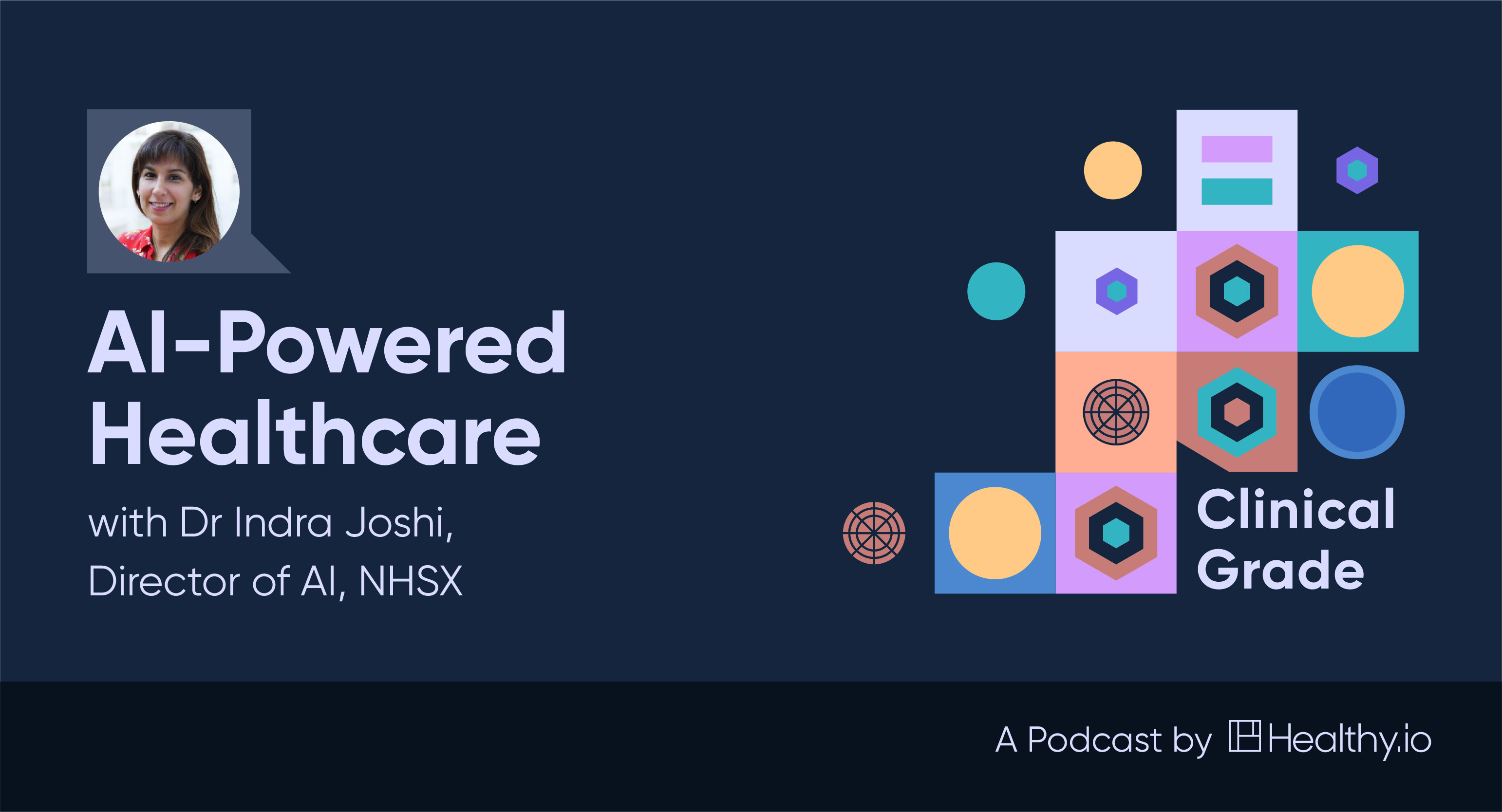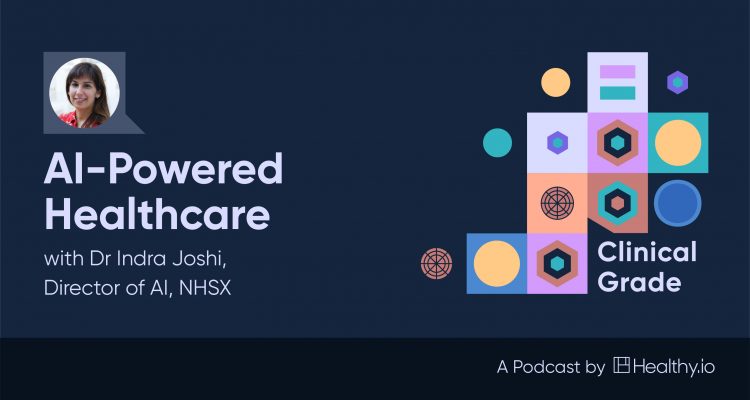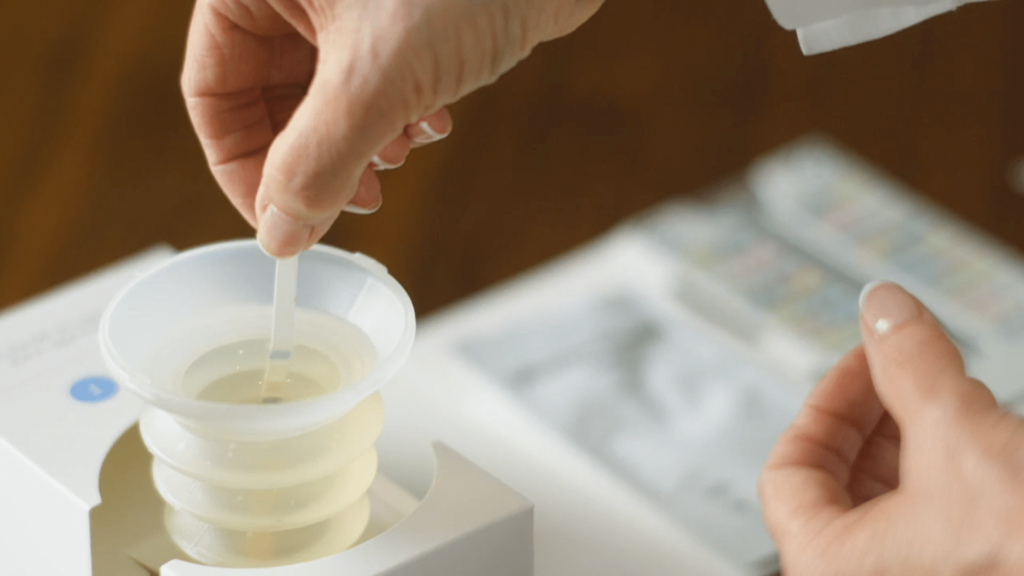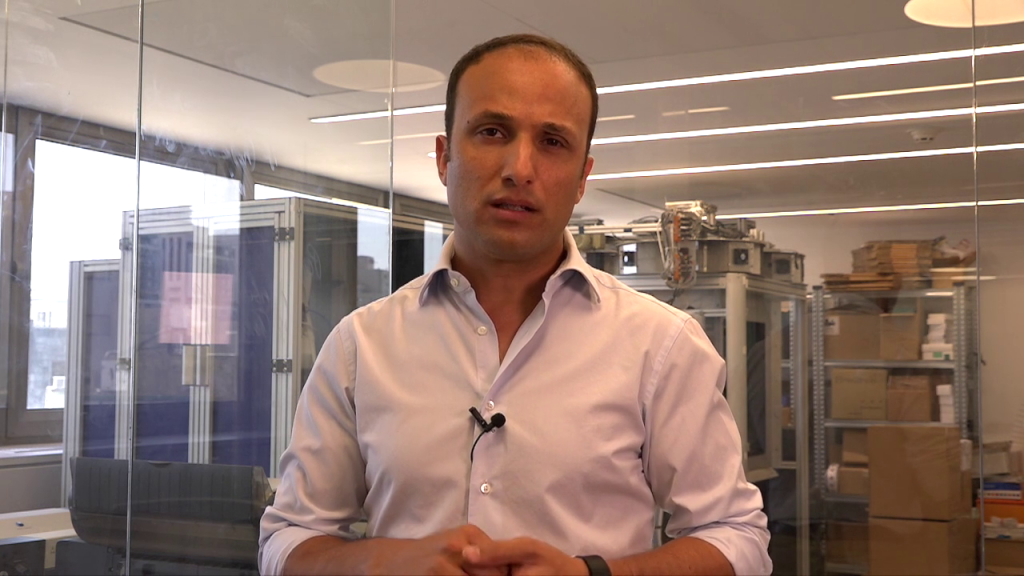Listen now:
The National Health Service is one of the United Kingdom’s most beloved institutions, and one of the largest healthcare systems in the world. While most of the attention it has recently received has been related to its urgent work during the pandemic, the NHS is renowned for its embrace of innovation. Dr Indra Joshi, Director of Artificial Intelligence for NHSX and the creator of the NHS AI Lab, is responsible for the adoption of cutting-edge healthcare technology across the NHS.
For our latest episode of Clinical Grade, Dr Joshi recently joined me and Katherine Ward, Healthy.io’s Chief Commercial Officer and GM UK & EU. We talked about the challenges and best practices of integrating the latest technologies into existing health systems. She also shared what organisations around the world can learn from the NHS, and her vision for how technology can help reduce societal inequities.
You can listen to Clinical Grade using the player above, and subscribe on Apple Podcasts, Spotify, Google Podcasts, or wherever you get your podcasts.
Episode Transcript
Dr Joshi, it’s great to have you with us. For those unfamiliar with the NHS’s AI initiatives, could you tell us a bit about yourself and the work that you do?
Dr Indra Joshi Sure. Thank you for having me. My name is Indra. I’m a doctor by background in emergency medicine. And what I do at the moment is I run a programme of work called the NHS AI Lab, which is a 250 million pound investment into AI and technology to try and accelerate the development and deployment of AI into the health and care system.
So speaking of acceleration, the past year or so has been quite remarkable in terms of how quickly the world has seemed to adapt to new innovations. What effect has the pandemic had on the use of AI in health care?
Dr Joshi Yeah, that’s an interesting question, isn’t it? I would take it back a bit and not necessarily focus on AI but what effect has technology had on the health care system? And it will still be ongoing because we are by no means at the end here. There’s been a significant amount of adoption of technology, but also acceptance of what it can do. And that’s because we’ve seen there’s been a common goal. Everybody’s got a common problem. And previously there were lots of disparate problems, but now everybody’s gone behind. Well, you know, there’s this global pandemic. It’s not just us here. It’s everywhere. Everybody’s got the same problem. And actually, technology is a great enabler to ensure that you can either communicate with people simply, or you can send them products or devices so they can look after themselves, or that you can use data in a way that’s actually quite helpful to understand both the spread of disease, but also the more operational side. So we’ve seen a huge array of what technology can do in this space.
Katherine Ward So what are some of the challenges that are facing innovative technologies like remote care using AI and what factors need to be put in place to solve for those challenges?
Dr Joshi It’s a great question. One of the things we’ve realised with the NHS AI Lab is getting the right evidence, or generating the right evidence, can often be quite a challenge to large-scale adoption. Sometimes in a smaller population, you can get that evidence. But if you want to roll it out to a larger population, showing that it will remain cost-effective, it will remain safe, is one of the challenges. The others, when it comes to AI more specifically, is what we call validating your model. So traditionally we’ve done what we call safety, efficacy, effective studies, RCTs, etc. But actually, when you come to technology, come to models and algorithms, that’s got to be seen slightly differently. So one of the things we’ve seen as a challenge is actually helping people validate their models on the most proportionate population that their product is supposed to work on. And that’s something that we’ll continue to develop in partnership with many of our innovators. And then the third is not a technology-specific one, but is a more general one, is both trust and adoption in that product. And I think when it comes to remote monitoring devices in particular, being able to trust that the product will do what it does, and being able to trust that you don’t necessarily need to see a human for that particular task, that we now begin to trust more, because people are saying, well, actually, it does work and it is doing what we thought it would do. So I think those are probably the three areas that I’d say at the moment.
Katherine Ward You lined me up beautifully for my next question, which was just thinking about that sense of the robotic—and AI can be caricatured as kind of robotic rather than human. When you think that through, how can tech solutions use AI without losing sight of the human element that is at the heart of health care?
Dr Joshi So I’m a doctor by background, I like helping people. I genuinely like helping people. And what I don’t like doing is doing the slightly mundane things. Like when I was a junior doctor, filling out discharge summaries, or filling out forms and kind of walking from one end of the hospital to another. Now, technology has enabled that to be dramatically changed, EHRs, etc. And I think where we see AI really helping is, again, freeing up some of those slightly mundane tasks or things that you don’t want to have to physically spend time doing. I think there’s a slight misconception, maybe, in the public eye of AI in health care and robots. I always feel that if you go back to some of the traditional thoughts of what AI can do. Take maps, for example. Really good use of AI You don’t always think of it as a robot, do you? Just think of it as a great tool that’s helping me do something that I just want to do and actually it’s freed up a huge amount of time. Remember the days of looking in the A to Z and trying to figure out a route and then, oh my God, we have to turn the page. Those days have gone. They’ve gone. Brilliant! And actually, travelling is so much easier because you know where you’re going and you know how to get there. And I’m hoping that with some of these AI products and tools and models that are coming out in health care, we start to get that same experience of actually this is now a fun job to do and it’s a great job to do. And actually it’s interesting and stimulating because some of those slightly mundane, frustrating, tricky bits have gone, because the technologies absorb them. And actually we get the time, but also the passion to do what we always wanted to do.
Katherine Ward Thinking about that sense of the patient and the behaviours that are at the heart of health care, and the fact that actually it’s changing, it’s activating, engaging patients, changing behaviours at scale, that could actually have one of the biggest impacts on our health care system. How can AI-powered solutions help drive that?
Dr Joshi It’s always about putting the person, isn’t it? It’s about making sure that that person isn’t a disease or a condition, but a whole person. And I think actually the power of AI, or the power of big data, is actually looking at all of that information in one place and actually being able to gain some insights. So I think when you actually take a step back and think, maybe not today, but maybe in a few years time as we get better and better data and we get more and more of it, actually being able to get better insights, better understanding of the whole, of the person in front of you, I think that’s where we’ll really hopefully truly realise it.
Katherine Ward So your work at the AI Lab, especially the flagship initiative, the AI Transformation Fund, has given you a front row seat to the most cutting-edge work in health care. What do you actually think it takes to implement a solution across the NHS?
Dr Joshi Oh, it’s always such a challenge, isn’t it? But I think the great thing about the NHS is it a national health care system. And then some of the more challenging things about the NHS is it is a national health care system. So we’re not talking about pockets. We’re talking about a wide population. And it goes back to my original comment that I mentioned. First, you need to build trust in that product. And trust quite often comes from making sure it’s been built in the right way. So showing the evidence, showing that you’ve met all the industry and the regulatory standards. And the second is that when we talk about AI and algorithms, is that it has been developed ethically. So you’ve got the right amount of data, quality, proportionality. It’s not biased in any way. And then once you can build that trust and that safety into your product, actually ensuring that it reaches the right people, so it goes to the right areas. And then you figure out—and I say figure out, because this is by no means an easy way—how that product integrates into either a care pathway, or what we call here in the UK a commissioning pathway. And then it has a longevity to it. So it doesn’t just come in and it’s just there, but actually it remains integrated into the care system. And so the latter bit is a real challenge. And that’s one of the things we’re really hoping with the Health and Care Award, the AI in Health and Care Award, is to work with commissioners to both help companies gain that evidence and that trustworthiness and the standards. But also to work on the flip side with commissioners so that they can see all of that, feel that this is the right product for them, or right device for them, and feel more confident in integrating it into what we call commissioning pathways, so that it can be rolled out more widely.
Katherine Ward And last question for me is what are some of the new trends that you’re most excited about?
Dr Joshi Oh, my goodness, I always find this so difficult because I’m such an excitable person. I get excited about so many things. And some examples that we’ve seen are through images, looking at different pathology in an image that you probably as a human, you’d never see it, but the computer can see it slightly more. And then, the other thing I get very excited about, is how this technology can reach people. We very often talk about technology increasing that kind of health inequality divide. And for me, I think, on a personal level, actually technology and these types of technology, hopefully, I’m quite excited that they may start reducing that inequality divide. Because if you go back to some of the original questions you asked me and say, well, actually, this is just there in the background, so people don’t think about it, they don’t use it, and therefore they’re more likely to have it there to either capture symptoms or capture appointments that they might not go to, share information, all of these things that go on in the background. And if we can distribute that, we can translate it into different languages. We can make sure that it’s accessible to people. I think there’s a real, real opportunity there. And that’s something that in my mind is fundamentally changing that paradigm of health, where it’s traditionally very paternalistic, you go and see somebody who wants something done to you—to actually, I’m taking control of my own health. I have the stuff I need, and I’m helped to be aware of when I need to go and approach someone else. That slight shift will be amazing. And that’s a really exciting opportunity on the horizon.
Finally for our listeners outside of the U.K., what are some of the things that the NHS is doing in the field that you would recommend they take a closer look at and possibly learn from?
Dr Joshi Good question. I think where we’re really good, in the NHS, is we do take a population-wide approach. We have some great programmes. We have a great institute called the National Institute of Clinical Excellence, NICE, which sets out some robust guidance and robust frameworks of how to generate evidence, but also how to make sure that your product is effective in the same essence. And so I think together with our regulators, they’re doing some really good work. They’re really working hard to create what we’re calling a joined-up frontend service, so that when innovators come to the UK, it’s clearer—that pathway from developing a product right at idea stage, to getting the right evidence to scale it up much more widely. And the other great things that are happening here in the UK—and Healthy.io is a brilliant example of it—is we’ve really invested in what we call later-stage technologies to roll out. And so often I go to conferences or I talk to people and they go, what’s the potential of AI? What’s it going to do? And the great thing here is actually we’re not talking about the potential anymore. We’re talking about, well, it’s happening. You know, we’re rolling these technologies out. We’re actually doing it here and now. And we’ve put the time, the effort, the investment, the skill set behind that to ensure that the population gets those products and those devices now, today. And I think that’s another exciting thing that’s happening here in the UK.











